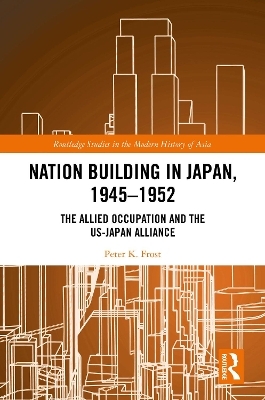
Nation Building in Japan, 1945–1952
The Allied Occupation and the US-Japan Alliance
Seiten
2024
Routledge (Verlag)
978-1-032-47033-7 (ISBN)
Routledge (Verlag)
978-1-032-47033-7 (ISBN)
This book begins by explaining why Japan spent roughly fifty years building its own colonial system and declaring war on China and the Western Allies, only to decide after military defeats to surrender before being invaded.
This book analyzes the Allied Occupation of Japan (1945–1952). It begins by explaining why Japan spent roughly fifty years building its own colonial system and declaring war on China and the Western Allies, only to decide after military defeats, two atomic bombings and the Soviet declaration of war, to surrender before being invaded. It goes on to describe the controversial issues surrounding the conduct of the Occupation forces, the largely American reform proposals and the shifts in policy as the Cold War developed. Particular emphasis is placed on women’s issues, the Japanese and American reactions to President Truman’s decision to fire General Douglas MacArthur, the tensions surrounding the requirement that the Japanese allow US military bases to stay in Japan and the still ongoing debate over the American decision to drop two atomic bombs on Japan. Despite all this, the book concludes that particularly when compared with later Allied nation building efforts in Vietnam, Afghanistan and Iraq and the current state of US politics, the Occupation experience was, on the whole, a relatively positive one for both the Japanese and the US-Japan alliance.
This book analyzes the Allied Occupation of Japan (1945–1952). It begins by explaining why Japan spent roughly fifty years building its own colonial system and declaring war on China and the Western Allies, only to decide after military defeats, two atomic bombings and the Soviet declaration of war, to surrender before being invaded. It goes on to describe the controversial issues surrounding the conduct of the Occupation forces, the largely American reform proposals and the shifts in policy as the Cold War developed. Particular emphasis is placed on women’s issues, the Japanese and American reactions to President Truman’s decision to fire General Douglas MacArthur, the tensions surrounding the requirement that the Japanese allow US military bases to stay in Japan and the still ongoing debate over the American decision to drop two atomic bombs on Japan. Despite all this, the book concludes that particularly when compared with later Allied nation building efforts in Vietnam, Afghanistan and Iraq and the current state of US politics, the Occupation experience was, on the whole, a relatively positive one for both the Japanese and the US-Japan alliance.
Peter K. Frost is the Frederick L. Schuman Professor of International Studies Emeritus at Williams College, USA
PROLOGUE
1. FROM WAR TO SURRENDER
2. THE OCCUPATION ARRIVES
3. A BATTERED NATION
4. PUNISHMENTS
5. KEY REFORMS
6. THE OCCUPATION CHANGES
7. AFTERMATH: JUDGING SUCCESS
EPILOGUE: NATION BUILDING
APPENDIX
BIBLIOGRAPY
ENDNOTES
| Erscheinungsdatum | 03.04.2024 |
|---|---|
| Reihe/Serie | Routledge Studies in the Modern History of Asia |
| Verlagsort | London |
| Sprache | englisch |
| Maße | 156 x 234 mm |
| Gewicht | 421 g |
| Themenwelt | Geschichte ► Allgemeine Geschichte ► Neuzeit (bis 1918) |
| Geschichte ► Allgemeine Geschichte ► Zeitgeschichte | |
| Geisteswissenschaften ► Geschichte ► Regional- / Ländergeschichte | |
| Sozialwissenschaften ► Politik / Verwaltung ► Europäische / Internationale Politik | |
| Sozialwissenschaften ► Soziologie ► Spezielle Soziologien | |
| ISBN-10 | 1-032-47033-X / 103247033X |
| ISBN-13 | 978-1-032-47033-7 / 9781032470337 |
| Zustand | Neuware |
| Informationen gemäß Produktsicherheitsverordnung (GPSR) | |
| Haben Sie eine Frage zum Produkt? |
Mehr entdecken
aus dem Bereich
aus dem Bereich
Giordano Bruno - ein ketzerisches Leben
Buch | Hardcover (2024)
C.H.Beck (Verlag)
29,90 €
das dramatische 16. Jahrhundert
Buch | Hardcover (2024)
Rowohlt Berlin (Verlag)
34,00 €


